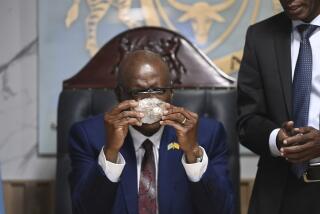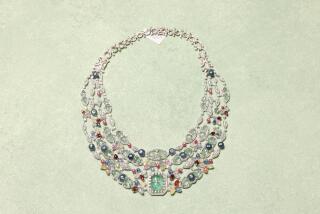Brazil’s claim adds yet another facet to the case of the Bahia Emerald
The bizarre, tortuous journey of the Bahia Emerald began in the depths of a Brazilian mine and eventually landed it in a Los Angeles County sheriff’s evidence locker, where it remains today.
Since 2009, the 180,000-carat, 840-pound behemoth of a gem has been the subject of a contentious court battle among a colorful crowd of gem traders, miners and a real estate tycoon all vying for the prized jewel — once valued at $372 million.
And just as the court saga appeared to be nearing a conclusion in recent months, a new party stepped up to stake its own claim to the stone.
The country that birthed it: Brazil.
“We’re trying to get back what belongs to us,” said Marconi Costa Melo, an attorney in Brazil’s attorney general’s office. “The emerald belongs to Brazil.”
The gem, unearthed in 2001 from a mine in the state of Bahia in eastern Brazil, is a hulking mass of rock with tubes of protruding green crystals. It is among the largest unbroken stones of its kind.
After its discovery, miners transported it to Sao Paulo, where it began an eight-year odyssey in which it repeatedly changed hands.
In 2005, the gem was shipped to a self-trained geologist and mining entrepreneur in Northern California who knew the original miners. He said he shipped it to New Orleans, where Hurricane Katrina submerged the stone for weeks near the French Quarter. After fishing it out, the man somehow lost possession of the gem and it eventually ended up in the hands of Larry Biegler, an investor from Paradise, Calif.
In 2009, Biegler reported it missing from a South El Monte vault. Los Angeles County sheriff’s investigators tracked the emerald to a Las Vegas vault, where it was stored by Idaho businessmen Kit Morrison and Todd Armstrong.
Morrison’s attorney, Andrew Spielberger, said his client and Armstrong purchased the gem from Biegler, paying seven figures. He declined to say exactly how much they paid.
“The only person that put real money to buy the thing was Morrison,” Spielberger said.
Sheriff’s investigators could not sort out who owned the gem, so they confiscated it — setting off years of litigation. Eight different people have come forward at one time or another to claim ownership.
Since then, the gem has been held in an undisclosed Sheriff’s Department location.
Sheriff’s spokeswoman Nicole Nishida said her agency has turned down scores of requests from reporters, filmmakers and others to see the emerald in order to guarantee its security. She said some have suggested they could be taken to the location while wearing a blindfold.
Through the years, some court claims — such as that of a man who said his proof was on a piece of paper destroyed in a house fire — were dismissed by a judge. Other people agreed to settle their claims with competing parties in return for a cut of possible sale profits.
Then came Brazil.
The Brazilian government entered the legal battle in September, saying that all other ownership arguments are irrelevant. The emerald, the South American nation claims, was illegally mined and exported.
In 2011, Brazil was notified by U.S. Immigration and Customs Enforcement of the emerald’s existence, Costa Melo said. Brazilian officials launched an investigation, learning that the emerald was illegally mined on Brazilian land, he said.
“We discovered that there was no authorization for the extraction of the emerald, no state permission to transport it or to export the emerald,” Costa Melo said.
For years, Brazilian officials have attempted to negotiate with the U.S. to secure the stone’s return, he said. They recently decided to join the legal fray in L.A. County’s court as another way to try to retrieve the gem.
A group led by Morrison, the Idaho businessman, is the only other party left in the legal case. His attorney, Spielberger, contends that Brazil waited too long to make a claim for the emerald.
“Five years of litigation, then all of a sudden at the end of all this a governmental entity says that they want to take it and repatriate it,” he said, “It was surprising. But this case, it’s so out of the norm that nothing surprises me.”
If Brazil wants the gem so badly, perhaps it can work out a deal, Spielberger said.
“My client didn’t buy this to keep it in his basement,” he said. “If the country of Brazil is interested in buying it from him and taking it back to put it on display — we see the value in that.”
Brazil’s Los Angeles-based lawyer, John Nadolenco, dismissed the notion.
“Brazil does not need to buy it from anyone,” he said. “The Bahia simply needs to be returned to its rightful home.”
Brazil has asked a judge to dismiss the case outright or put it on hold while Brazilian officials continue to press the federal government to return the gem.
“Brazil respects the court system of the United States but respectfully asserts that the L.A. Superior Court is not the proper forum for deciding the ownership of the gem,” said Nadolenco, a partner at Mayer Brown. “It’s a matter of international relations, and it must be decided through diplomatic relations.”
The stone has immense cultural and scientific value and should be on display for all to experience, Nadolenco said.
“My firm and I feel fortunate that we get to play the role of Indiana Jones,” Nadolenco said. “I hope one day I get to take my family to visit it in a Brazilian museum.”
Twitter: @sjceasar
More to Read
Sign up for Essential California
The most important California stories and recommendations in your inbox every morning.
You may occasionally receive promotional content from the Los Angeles Times.










